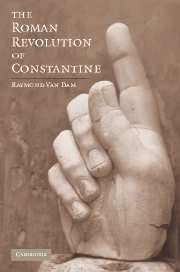Book contents
- Frontmatter
- Contents
- PREFACE
- ABBREVIATIONS
- Map
- Introduction: AUGUSTUS AND CONSTANTINE
- SECTION I A ROMAN EMPIRE WITHOUT ROME
- SECTION II A GREEK ROMAN EMPIRE
- 5 CONSTANTINE'S DIALOGUE WITH ORCISTUS
- 6 “THE MOST HOLY RELIGION”: PETITIONING THE EMPEROR
- 7 “THE ROMAN LANGUAGE”: LATIN AND THE GREEK EAST
- 8 FALLING WATER
- SECTION III EMPEROR AND GOD
- Epilogue: ONE EMPEROR
- APPENDIX 1 HISPELLUM: DATE, TEXT, AND TRANSLATION
- APPENDIX 2 ORCISTUS: DATES, TEXT, AND TRANSLATION
- EDITIONS AND TRANSLATIONS
- BIBLIOGRAPHY
- INDEX
6 - “THE MOST HOLY RELIGION”: PETITIONING THE EMPEROR
Published online by Cambridge University Press: 05 June 2012
- Frontmatter
- Contents
- PREFACE
- ABBREVIATIONS
- Map
- Introduction: AUGUSTUS AND CONSTANTINE
- SECTION I A ROMAN EMPIRE WITHOUT ROME
- SECTION II A GREEK ROMAN EMPIRE
- 5 CONSTANTINE'S DIALOGUE WITH ORCISTUS
- 6 “THE MOST HOLY RELIGION”: PETITIONING THE EMPEROR
- 7 “THE ROMAN LANGUAGE”: LATIN AND THE GREEK EAST
- 8 FALLING WATER
- SECTION III EMPEROR AND GOD
- Epilogue: ONE EMPEROR
- APPENDIX 1 HISPELLUM: DATE, TEXT, AND TRANSLATION
- APPENDIX 2 ORCISTUS: DATES, TEXT, AND TRANSLATION
- EDITIONS AND TRANSLATIONS
- BIBLIOGRAPHY
- INDEX
Summary
In order to differentiate itself from nacolea, one argument that Orcistus used in this petition was an appeal to religious affiliation. Constantine himself noted that this plea was the climax of the petition, and he seems to have been quoting or paraphrasing when he stated in his letter “that all are said to reside there as supporters of the most holy religion.” This description was obviously rather vague. In fact, if somehow the inscribed version of this dossier had been mutilated so that the salutations were lost and the letters and petition were anonymous, it would be quite possible to interpret this description of the people of Orcistus in terms of a general affiliation to some pagan cult, certainly something other than Christianity. Perhaps the people of Orcistus were unsure about how to approach Constantine.
TOLERATION AND PERSECUTION
Recent history would have made them wary. In the eastern empire Diocletian, his fellow Tetrarch Galerius, and their successors had been quite inconsistent in their pronouncements about religions. Not only had they promoted pagan cults and ordered the persecution of Christians, but they had also flip-flopped repeatedly in their religious policies. Even when Constantine's immediate predecessors had articulated and tried to enforce clear religious preferences, none of their policies had lasted long without further modifications.
Although he had a reputation for his scrupulous preservation of “the most traditional of religions,” for most of his reign Diocletian had apparently been prepared to tolerate Christianity: “persecution was not part of Diocletian's grand design for the Roman Empire.”
- Type
- Chapter
- Information
- The Roman Revolution of Constantine , pp. 163 - 183Publisher: Cambridge University PressPrint publication year: 2007



